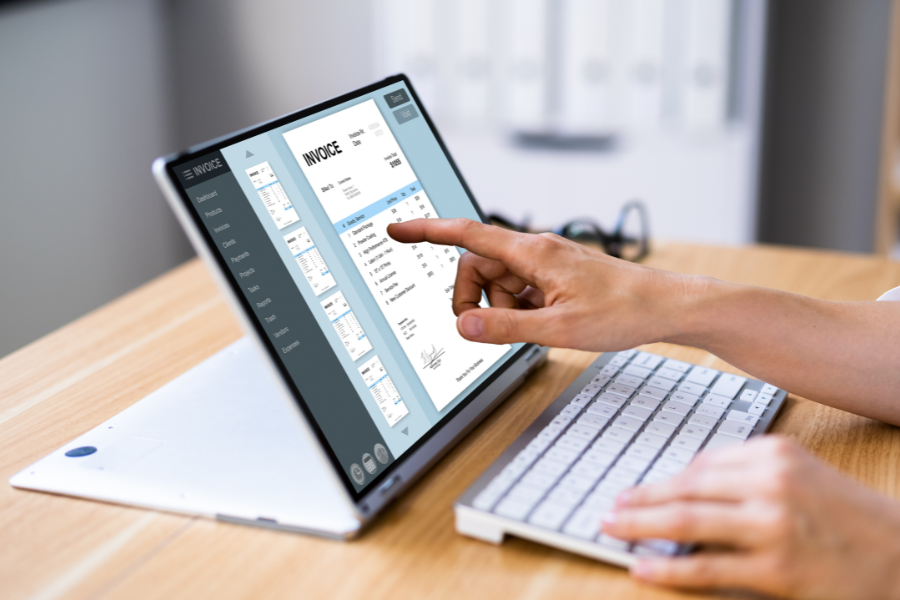In this era of technology advancement and progress towards a digitalized world, e invoicing is increasingly becoming a common practice adopted by businesses globally. The transition from the paper based invoicing methods to digitized systems is more than just a passing phase; it has now become essential to ensure smooth operations, precise calculations and adherence to financial regulations.
As we look ahead, to 2024 various significant developments are poised to influence the e landscape bringing forth fresh possibilities and obstacles for businesses to navigate. In this blog post we delve into the e invoicing trends expected for 2024 and their potential influence on your business functions.With technology progressing rapidly and regulatory landscapes evolving it’s essential for companies to stay abreast of these trends to stay ahead competitively and guarantee efficient financial processes moving forward.
The Rise of Real-Time E-Invoicing
Time electronic invoicing is becoming increasingly popular as governments and businesses aim to improve transparency and streamline financial transactions efficiently instead of relying on traditional invoicing methods that cause delays. Real time e invoicing allows for transmission and processing of invoices compared to the slower traditional methods. This upward trend is anticipated to continue into 2024 with an increasing number of countries adopting real time e systems as a crucial component of their tax and compliance protocols.
Businesses are now focusing on payments and better management of their finances due to this change happening around them – it leads to fewer mistakes and improved control over the flow of money coming into the company’s account or leaving it. To adapt to these changes effectively and keep up with the rules and expectations emerging from this shift towards faster payments and better financial management practices within companies today; businesses need to make sure their invoicing systems are up to date. By integrating real time e processes into your business operations promptly; you’ll be able to simplify your workflows significantly while also ensuring that you’re following all relevant rules and regulations without any errors creeping into your financial records.
Ensuring that your invoicing processes are compliant with real time standards will also help you lower the chances of facing fines or penalties for submitting erroneous documents because compliance is key when it comes to maintaining a good standing with regulatory authorities these days. As businesses everywhere start demanding openness and transparency when it comes to financial matters; companies that embrace real time e invoicing solutions early on will have a competitive edge as they’ll be better equipped to meet market demands swiftly and also comply with changing regulatory requirements smoothly.
Global E-Invoicing Standardization
As the world economy becomes increasingly intertwined on a scale there is an increasing demand for standardized electronic invoicing procedures across different countries and regions. By the year 2024 we anticipate progress towards standardizing global e-invoicing with efforts such as the Peppol (Pan European Public Procurement Online) network taking the forefront.
Peppol has been making progress across Europe and parts of Asia as well as Australia and is projected to see further growth by 2024.For companies with a global presence standardizing their e invoicing systems like Peppol can streamline international transactions cut down on expenses and ensure adherence, to different regulations.Integrating an e invoicing strategy can also assist enterprises to uphold uniformity and precision throughout their invoicing procedures regardless of their geographical reach. Businesses that adhere to the evolving standards will have smoother pathways for growth and participation in international commerce.
Integration of AI and Machine Learning in E-Invoicing
AI and machine learning technologies are revolutionizing sectors including e invoicing too! By 2024 we’ll see a bigger impact of AI and ML as they streamline invoice tasks like creating invoices and extracting data while also enhancing fraud detection and compliance checks.
E invoicing systems powered by AI have the ability to scan through amounts of data instantly to detect irregularities and patterns that could signal potential fraud or mistakes.In addition, to this capability these systems can also utilize transaction data to forecast upcoming trends and streamline invoicing procedures.By incorporating AI and machine learning technologies into your e systems you can boost productivity minimize manual mistakes and acquire meaningful perspectives on your financial processes. The ongoing progress of AI technologies suggests that electronic invoicing procedures will grow smarter and more self-sufficient over time—enabling companies to prioritize decision making over mundane administrative duties.
Increased Focus on Data Security and Privacy
With the increasing adoption of invoicing systems across industries today comes a heightened emphasis on safeguardinG the security and confidentiality of data used for financial transactions. In the year 2024 companies must place a high importance on securing confidential financial information as cyber threats continue to evolve and grow more complex. AdherinG to data protection laws such as GDPR within Europe and CCPA within the United States will be paramount, for organizations operations.
To protect your invoicing information effectively, think about using strong encryption methods, secure access controls and regular security evaluations. Collaborating with electronic invoicing service providers who follow the most stringent security guidelines can also reduce risks. By securing the safety and confidentiality of your invoicing data you not only safeguard your company but also establish trust with your customers and associates. As cybersecurity risks advance, proactively addressing security obstacles will be crucial for upholding the trustworthiness of your activities and preserving your standing within the industry.
E-Invoicing as a Tool for Sustainability
In the present world, a concern for sustainability is growing, which e-invoicing can help further towards the objectives. We anticipate that during the year 2024 most organizations will incorporate e-invoicing as part of their sustainability plan. The use of electronic invoicing negates the use of paper and when businesses adopt e-invoicing they play their part in the preservation of the environment.
In addition, some governments provide special incentives to those companies if they implement and use such solutions as e-invoices. Adoption of e-invoicing enables your business organization to not only make improvements in its efficiency but also show a good image by respecting the environment which attracts more customers with similar values. Given that customers and organizations remain pressured by environmental issues addressing sustainability as organizational practices are strategic to meet market demands.
The Growing Adoption of Blockchain Technology
Blockchain is not confined to few industries but you can witness the wave all over sectors and e-invoicing is one among them. Green e-invoicing is expected to gain popularity in 2024 because of blockchain’s capability of enhancing the clarity, security, and unalterability of financial transactions.
The use of e-invoicing based on blockchain technology makes it possible to track invoices in real time, thus minimizing the possibility of fraud and providing all the members with information in their possession. In addition, this technology can also enable smart contracts for invoice settlement which also can be automated. Despite the fact that it is still budding, blockchain presents a conservative estimate of changing e-invoice processes in future years. In the future as the technology grows, the companies using blockchain technology for invoicing will be ahead in innovation having stronger trust and fewer steps between them.
The Impact of E-Invoicing on SME Growth
Small and Medium Enterprises (SMEs)’s are usually challenged when it comes to implementing new technologies since they possess few resources. Still, in 2024, there will be a change towards even more solutions that will focus only on SMEs in the e-invoicing world. These solutions will be cheap to implement, easy to use and can be subscribed through different models to meet the needs of SMEs in the market hence can help SMEs to out-compete other players in the market.
For the SME’s, e-invoicing provides better ways of managing cash flow, spending less time on manual processes and legal compliances. Through the implementation of e-invoicing, the SMEs are likely to realize operational efficiency and therefore lead to business growth and expansion. This means that, as more solutions tailored to the particularity of an ever-growing SME audience come into the market, these businesses will have the tools they need to compete on equal footing in a competitive business world.
Conclusion
The e-invoicing landscape is rapidly evolving, with new trends emerging that promise to reshape how businesses handle financial transactions. In 2024, real-time e-invoicing, global standardization, AI integration, data security, sustainability, blockchain, and SME-focused solutions will be at the forefront of this evolution.
By staying informed about these trends and adapting your e-invoicing practices accordingly, your business can stay ahead of the curve, improve operational efficiency, and maintain compliance with the latest regulations. Advintek, with its commitment to innovation and excellence, is here to support you in navigating these changes and optimizing your e-invoicing processes for success in 2024 and beyond.









